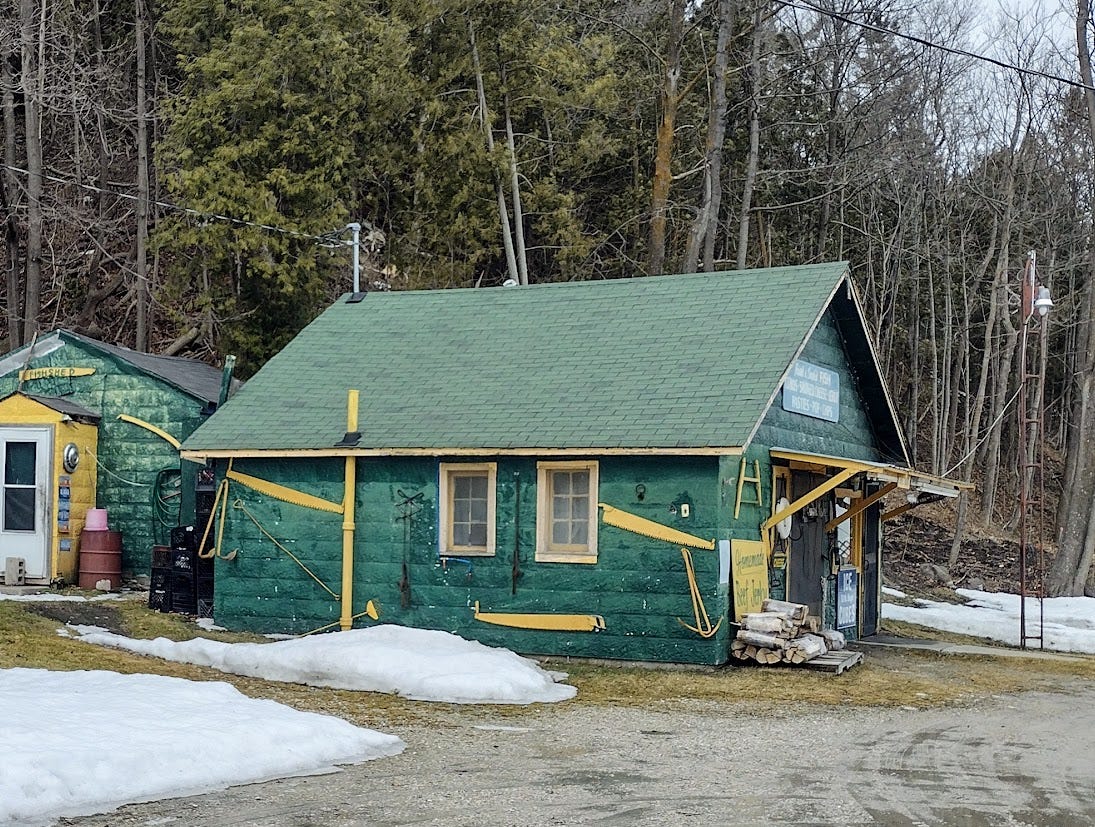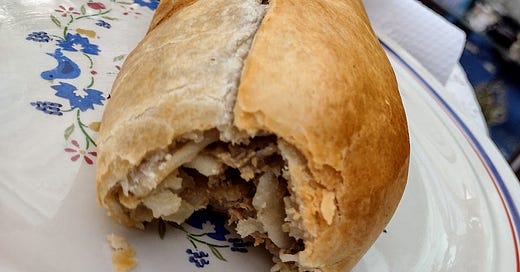Off Season at the Great Lakes
ANNETTE ON THE ROAD Exclusive Post for Nonnies! Fish, Fudge, and Pasties: Foods from History in Northern Michigan
How Long is This Post? Around 3,000 words. About 15 mins read.
You might want to pull up a map of the US for this one!
So here I am on the Upper Peninsula in Northern Michigan in the off season with He Who Shall Not Be Named on The Internets (HWSNBNOTI, or Hoosen Benoti), savoring the joys of off-season lull-in- the-pandemic travel.
This is my first Annette on the Road post since November!
{mournful guitar music} The story goes from the Chippewa on down, mumble mumble, the lake that they called Gitchi-Goonie,Superior, they said, never gives up her dead, mumble mumble.
Ever since we started driving alongside Lake Michigan, Hoosen and I have both (we just learned from each other) been silently singing the bits we remember of The Wreck of The Edmund Fitzgerald in our heads. Does anyone know how to evict Gordon Lightfoot?
Okay, so the song is set on a stormy Lake Superior, and we’re not going that way, but clap your eyes on the frozen freshwater sea of its sister, Lake Michigan, stretching all the way to the horizon, and I defy you not to start humming that bloody song.

REASONS TO BE A TOURIST AROUND THE GREAT LAKES (specifically in Michigan’s Upper Peninsula) WHEN THERE’S STILL SNOW ON THE GROUND

PROS (according to Hoosen)
Cheap hotels that are nice enough for Annette Not to Complain
No crowds
The weather is bracing
CONS (according to Annette)
Nothing is open. Not restaurants, not museums (which you will no doubt guess correctly is not, shall we say, optimum, when I'm writing for you), not ice cream shops, and not souvenir shops (Hoosen fails to see how this last one is a problem at all).
Blimey. I couldn't even snap a photo of Jesuit Missionary Father Marquette's statue: Since Michigan doesn't staff the ticket booth in winter, and they don't want you communing with the good Father's statue for free, they pile up snow to keep you out, which is NOT HOSPITABLE.
AND IT’S BLOODY FREEZING UP HERE.

Meanwhile, the local museum in St. Ignace is closed because they’re moving to a bigger, better place by 2023, and the museum in the former French mission church dedicated to the Ojibwe (or Chippewa) people is closed for the duration of the pandemic as far as I can see. Even the ghastly “Indian Village” museum/tourist trap/souvenir shop, laughing from across the street at the respectable Objibwe Culture Museum, is closed.
By the way, across the country, Indians have not messed around where COVID is concerned: Indians know a thing or two about the devastation brand new diseases can leave behind. Do know, however, that while Gordon Lightfoot created the impression in his song that the Ojibwe have all gone away now, they absolutely have not. There’s even a charter school near here that is aimed at Ojibwe kids, and teaches a lot about Ojibwe culture
And for us tourists? Okay, some things are open. Sadly, the adorable shack selling smoked fish is not among them, despite what it says on the Google.

But—hallelujah— here’s Massey Fish Co., the wholesale smoked fish merchant which sells to farmers' markets around Michigan (“same size as France” points out the nice woman behind the counter, helpfully, and in a comparison that may well resonate in an area where the French initially beat the Brits in the Great Colonization Race)!
Choices are three kinds of smoked fish. Get the whitefish, says the internet, so I did. Let's be clear that when we say “whitefish” , that's not a generic reference to white-fleshed fish. Whitefish is a specific variety of fish in the Great Lakes, and very good it is, too. There's also fish pate, which isn't pate at all, but a clearly modern spread involving smoked fish and cream cheese and chives, which goes very nicely on water biscuits.
Smoked fish is one of the three distinctive processed food itemries in the holy triumvirate of local foods here on the edge of the inland seas called Lake Michigan and Lake Huron. The others are pasties (these are savory hand pies, not the naughty bandaids for the most prominent parts of the breasts) and fudge.
Each of these foods has a separate story, not shockingly, but they’re all very American.
Smoked Fish
Smoked Great Lakes fish started with the Ojibwe people in the region, who smoked fish from the abundant supply here for easy carrying in the winter. They didn’t need to, mind, because they also invented ice fishing, something of which most of the rest of us were unaware until we saw Jack Lemmon and Walter Matthau ice-fishing in Grumpy Old Men.
I have no idea about fishing history in the area, but on the way here, I learned from those historical marker thingies (which are typically tedious, so don’t worry if you don’t usually stop for them) about the hamlet of Epoufette. Here, a French Canadian arrived in the middle 19th century, and started fishing. By the mid-1870s, a visiting French priest from St. Ignace found his family running a humming enterprise, with fishing nets up to 40 miles from shore, and two coopers (barrel makers) kept on full time making barrels, into which workers packed salted fish for export.
Commercial smoked fish and the fish spread pate thingy? That all got launched when Norwegians arrived, apparently. They also supplied Great Lakes whitefish to the growing Jewish community of late 19th century Chicago, and rabbis even popped up to this area occasionally to inspect the premises, to make sure the processing was kosher, and, I am sure, enjoyed themselves sampling the wares just to make absolutely certain they were suitable. Nom nom.
The smoked fish here in Michigan is saltier than my all-time favorite traditional smoked fish, the Arbroath Smokie, a smoked haddock, from my wee bit of Scotland. But tasty all the same.
Not a fish person? No worries. Up next are meat pies and fudge.




